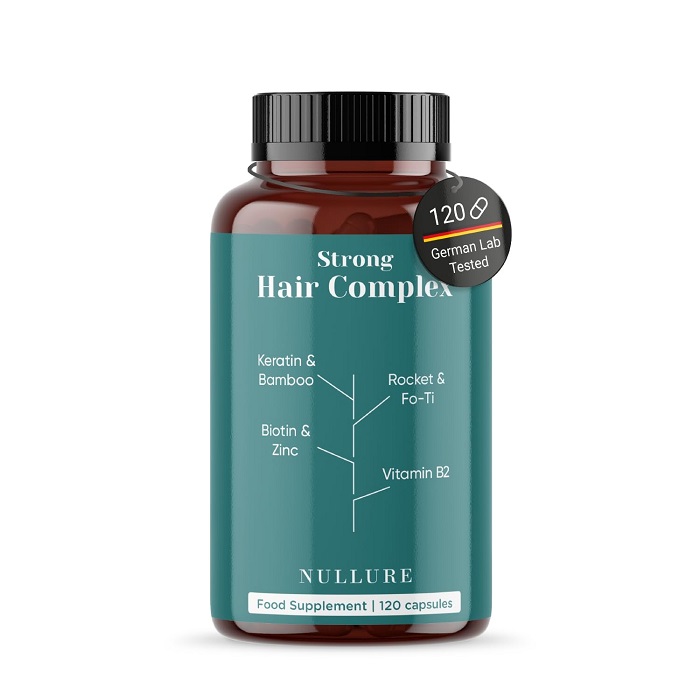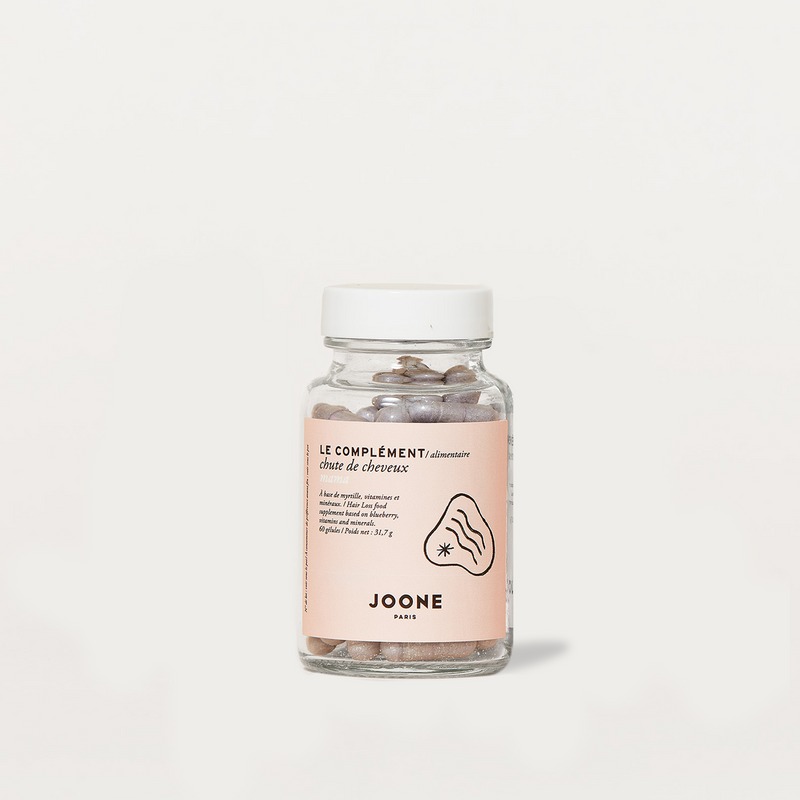
Introduction to Hair Growth and Hair Vitamins
Our locks need the right nourishment to thrive. Hair vitamins are key to this process. They target deficiencies and boost follicle health. Like a garden, hair needs various nutrients to grow. Vitamins and minerals are to hair what water and sun are to plants. In this section, we’ll explore how specific vitamins affect hair growth. Understanding this can help you achieve stronger, healthier hair.
The Impact of Diet on Hair Health
Good eating habits can make your hair strong. The foods you eat provide vitamins and minerals for hair growth. Eating poorly can lead to hair loss. This is because your body lacks key nutrients. For example, not getting enough protein can make hair weak. This leads to hair breaking more easily. Iron-rich foods help carry oxygen to your hair roots. This helps your hair grow well. If you don’t eat enough iron, you may lose hair. Vitamins like biotin and vitamin D are also important. They help create new hair and keep it healthy. Eating a variety of foods gives your hair what it needs. Include items like vegetables, fruits, protein, and whole grains in your meals. This can help prevent hair loss. It can also support new hair growth. Sometimes, diet alone isn’t enough. That’s when you may need extra vitamins or minerals. Taking supplements can help fill the gaps in your diet.
Identifying Common Causes of Hair Loss
Encountering hair loss can be distressing and understanding the causes is key. Hair loss, known medically as alopecia, can stem from various factors. Genetics often play a central role in hair thinning, especially in male and female pattern baldness, which is a hereditary condition. Hormonal changes, such as those during pregnancy or menopause, can also trigger hair loss. Nutritional deficiencies are significant contributors to weakening hair strands. Inadequate intake of key vitamins and minerals may lead to hair falling out. Stress, both physical and emotional, can lead to a temporary condition known as telogen effluvium, where hair prematurely enters the resting phase and then falls out. Autoimmune diseases, like alopecia areata, cause the immune system to attack hair follicles. Medical treatments, including chemotherapy, can lead to hair loss as well. Other common causes include certain medications, rapid weight loss, and harsh hair care practices that damage the scalp or hair fibers. By pinpointing the cause, you can better address hair loss and seek appropriate treatments or lifestyle changes.
Essential Vitamins and Minerals for Hair Growth

Achieving vibrant hair requires the right mix of nutrients. Like all parts of the body, the scalp and hair follicles benefit from a nutritious diet. Specific vitamins and minerals are known to be essential for hair growth. Let’s dive into some of these key nutrients and understand their roles.
Vitamin D and Hair Follicle Development
Vitamin D is crucial for the birth of new hair follicles. It aids in the creation of the tiny pores from which hair sprouts. Low levels can slow hair growth or enhance hair loss. Sun exposure and certain foods can boost Vitamin D, but supplements may be needed.
Iron’s Role in Hair Growth and Oxygen Transport
Iron is vital for hair growth. It carries oxygen to hair roots, nourishing them. An iron-rich diet, or supplements in case of deficiency, can help reduce hair loss. It’s especially important for women who are more prone to iron-deficiency.
The Importance of Biotin and Protein
Biotin and protein are building blocks for hair. Biotin, a B vitamin, supports strong hair. Protein, which hair is made of, gives hair its structure. A lack of either can cause hair to weaken or shed.
The Antioxidant Power of Vitamin E
Vitamin E is an antioxidant that fights damage from free radicals. These nuisances can harm hair follicles. By protecting the scalp, Vitamin E keeps hair strong and intact. It’s found in nuts, seeds, and leafy greens.
Zinc: A Critical Mineral for Hair Tissue Growth and Repair
Zinc aids in hair tissue growth and repairs damaged hair. Without it, hair can become thin and fall out. A balance of zinc from food or supplements supports hair health.
When considering vitamins for hair growth, it’s important to check for deficiencies first. If you’re eating a balanced diet but still facing hair loss, supplements may be necessary. Always speak with a healthcare professional before starting new vitamins or supplements.
Addressing Hair Loss Through Nutritional Supplementation

In the quest for healthier hair, supplementation can offer a helping hand. Particularly when dietary adjustments fall short, or when specific deficiencies are diagnosed, supplements may bridge the gap. Let’s assess how incorporating multivitamins or targeted supplements into your routine can enhance hair health.
The Role of Multivitamins in Hair Health
Multivitamins can ensure you hit daily nutrient needs. They are a blanket approach to filling nutritional gaps. Think of them as a safety net for your hair’s health. A key benefit is their diverse vitamin and mineral profile. This captures a wide range of nutrients needed for strengthening hair. Multi’s can be especially useful for those with diet limitations.
However, not all multivitamins are equal. Look for formulas that have specific hair-supporting vitamins. These include vitamins D, E, Biotin, Iron, and Zinc. Some multis also pack in amino acids for protein synthesis, crucial for hair structure.
An added advantage is convenience. If your diet varies or is unpredictable, a daily multivitamin offers consistency. Remember, consistency fuels results. Over time, regular intake can make a visible difference in hair health.
Guidance on Taking Hair Vitamin Supplements Safely
While tempting, more isn’t always better with supplements. High doses can lead to toxicity, particularly with fat-soluble vitamins like A and D. To avoid risks, follow these guidelines:
- Stick to suggested doses. More can harm rather than help.
- Avoid doubling up on supplements. If you take a multi, you may not need additional single vitamins.
- Discuss with your healthcare provider before beginning any supplementation, especially if you have underlying health conditions or take other medications.
By being mindful of these tips, you can support your hair health while steering clear of any potential supplement pitfalls. Remember, supplements are allies, not magic bullets. They work best when combined with a nutritious diet, good hair care practices, and a healthy lifestyle.
Hair Vitamin Supplements: Myths and Facts
In the world of hair care, supplements often get surrounded by myths and half-truths. As someone hoping to boost their hair health, it’s crucial to separate fact from fiction. Here, we’ll debunk some common misconceptions and provide factual insights about hair vitamin supplements.
Myth: Vitamins Guarantee Hair Growth
One common belief is that taking vitamins will ensure hair growth. The truth is, vitamins can support hair health but can’t promise growth. Hair growth is complex and influenced by various factors.
Fact: Deficiencies Can Lead to Hair Loss
A fact worth noting is that a lack of certain vitamins can contribute to hair loss. Vitamins D, B (especially biotin), and iron are all crucial. If you lack these, supplements may help. But remember, they’re just part of a larger picture.
Myth: More Vitamins Mean Better Results
Another myth is the idea that the more vitamins you consume, the healthier your hair will be. Too much can harm, not help. Stick to recommended doses to avoid toxicity.
Fact: Hair Supplements Need Time to Work
Hair growth vitamins aren’t overnight miracles. They need time to show results. Generally, expect to wait a few months to see any changes. Patience is key when using supplements for hair health.
Myth: Hair Supplements Work for Everyone
Not everyone will experience the same benefits from hair vitamins. Genetics, existing health conditions, and overall diet also play roles. They aren’t a universal fix.
Fact: Professional Guidance Is Important
Consulting with a healthcare provider before starting supplements is wise. They can guide you based on your individual health needs and prevent potential risks from inappropriate use.
Understanding these myths and facts can help you make informed decisions about hair vitamin supplements. Remember, it’s always best to approach hair care from a balanced viewpoint, emphasizing diet, good hair practices, and the appropriate use of supplements.
When to Consult a Professional for Hair Loss

Seeking professional advice is essential when you notice unusual hair shedding. Frequent hair loss may indicate underlying health concerns. It’s important to distinguish between normal hair shedding and potential alopecia signs. Experiencing sudden bald patches, excessive thinning, or scalp issues warrants a medical consultation.
A dermatologist or trichologist can assess your scalp health and hair loss patterns. They diagnose conditions contributing to hair loss, helping craft a personalized treatment plan. Your family doctor can check for nutrient levels and discuss possible vitamin supplementation.
Professional guidance is particularly crucial when hair loss affects your well-being. Emotional distress from hair loss is real and seeking support, including psychological counseling, can be beneficial.
If your self-help approaches, like diet changes or OTC supplements, have failed, a professional can offer alternative strategies. They can determine if you need prescription medication or if your hair loss is linked to other medical conditions.
Remember to consult your doctor before taking any new supplements. This is especially vital if you have existing health issues or are on medication. Blood tests may reveal deficiencies that need addressing through diet or supplementation.
Conclusion: A Balanced Approach to Hair Care
A multi-faceted approach to hair health is best. Combine a nourishing diet, proper hair care, sensible supplementation, and professional advice when needed. Addressing hair loss proactively can lead to better results and improved overall well-being.
Conclusion: A Balanced Approach to Hair Care
Achieving a full head of healthy hair involves a multi-pronged strategy. It’s not just about picking the right hair vitamins or hoping for a quick fix. A well-rounded approach is vital. Here’s how to wrap it all together:
- Nourish from Within: Begin with a balanced diet full of diverse nutrients. Incorporate foods rich in vitamins D, E, biotin, and minerals like iron and zinc. They are the foundation of hair health.
- Stay Consistent: Whether it’s your diet or hair care routine, consistency is key. Regular nourishment supports stronger, more resilient hair over time.
- Smart Supplementation: Take supplements if needed, but always with caution. Stick to recommended dosages and consult with a healthcare provider beforehand.
- Gentle Hair Practices: Treat your hair with care. Avoid harsh chemicals and styling practices that can damage hair and scalp.
- Monitor Hair Health: Pay attention to your hair. If you notice excessive shedding or thinning, it’s time to act. Don’t ignore the signs.
- Seek Expert Advice: For persistent hair issues, see a professional. A dermatologist can get to the root of the problem and suggest effective treatments.
- Stay Patient: Hair growth takes time. Don’t expect overnight miracles from hair vitamins or treatments. Give your hair the time it needs to respond.
In summary, the best approach to hair care marries nutrition, proper care, and professional guidance. It’s not solely about the hair vitamins you take, but how you integrate them with a healthy lifestyle and hair care practices. So here’s to strong, vibrant locks that not only look good but reflect your overall health!





